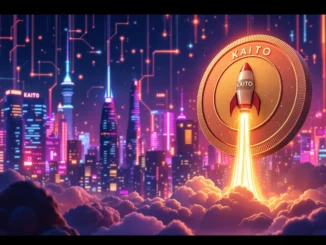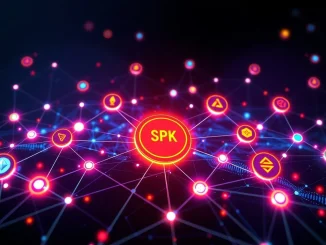
In a move that has sent ripples through the Web3 space, especially within the fervent fanbase of the Bored Ape Yacht Club, reports suggest that Yuga Labs, the powerhouse behind the iconic NFT collection, is pushing for a dramatic shift in the governance of its associated token. The core of this proposed change? The potential dissolution of the ApeCoin DAO. This development marks a significant departure from Yuga Labs’ previous stance of maintaining distance from the token’s governance, raising questions about the future of decentralized decision-making in major Web3 projects.
Why is Yuga Labs Targeting the ApeCoin DAO?
According to reports citing JinSe Finance, Yuga Labs co-founder Greg Solano has outlined the rationale behind this surprising proposal. The current structure of the ApeCoin DAO is reportedly viewed by Yuga Labs as an outdated, inefficient, and unproductive experiment in governance. The argument presented is that the decentralized autonomous organization has become a drain on valuable resources, potentially hindering swift decision-making and strategic execution necessary for the ecosystem’s growth.
Think of it like a large committee trying to make quick decisions versus a smaller, more focused team. While the committee (the DAO) represents a broader range of voices, it can often get bogged down in debate and conflicting priorities. Yuga Labs’ perspective seems to be that this process is no longer serving the best interests of the ecosystem.
What Does This Mean for ApeCoin and Its Holders?
The proposal, if accepted, would involve a fundamental restructuring of the ApeCoin ecosystem’s control. The plan reportedly calls for:
- Transferring all assets currently held by the ApeCoin DAO to a newly formed entity under the Yuga Labs umbrella, tentatively named “ApeCo.”
- Shifting all responsibilities currently managed by the DAO to this new ApeCo entity.
- Crucially, revoking governance rights from existing ApeCoin holders.
For individuals holding ApeCoin, this last point is particularly significant. Their ability to vote on proposals affecting the ecosystem, a core tenet of the DAO structure, would be removed. This transforms ApeCoin from a token with governance utility into potentially just a utility or value transfer token within an ecosystem centrally managed by Yuga Labs.
A Shift in Crypto Governance Philosophy?
This move by Yuga Labs highlights a recurring tension within the Web3 space: the balance between decentralization and efficiency. DAOs were envisioned as a revolutionary form of Crypto Governance, empowering communities and moving away from centralized control. However, the practical implementation of DAOs has faced challenges, including voter apathy, proposal fatigue, difficulty in achieving consensus, and the potential for large token holders to disproportionately influence outcomes.
Yuga Labs’ proposal suggests they may now prioritize the streamlined decision-making and clear direction that a centralized entity like ApeCo could provide, even at the cost of community governance. This isn’t an isolated debate; many projects grapple with finding the optimal level of decentralization that fosters community engagement without sacrificing agility and effective management.
Implications for the Web3 Community
The outcome of this proposal could set a precedent for how large projects handle their associated tokens and governance structures, impacting the broader Web3 Community. If a prominent project like ApeCoin moves away from DAO governance towards a more centralized model, it might lead other projects to reconsider their own structures.
Here are some potential impacts to consider:
- Trust and Transparency: Will the community trust a centralized entity (ApeCo/Yuga Labs) to manage the ecosystem’s funds and direction as much as a decentralized one?
- Innovation: Will removing community governance stifle grassroots innovation and contributions that the DAO structure might have encouraged?
- Token Value: How will the market react to ApeCoin losing its governance utility? Will its value be solely tied to its use within the Yuga Labs ecosystem?
- Future DAO Models: Will the perceived failure or inefficiency of the ApeCoin DAO model lead to the development of new, more effective hybrid governance structures?
What Happens Next?
This proposal is just that – a proposal. The process for its potential adoption or rejection is likely subject to the existing DAO governance mechanisms, at least initially. ApeCoin DAO holders would typically vote on such significant changes. However, the specifics of how this proposal navigates the current governance framework, given its aim to dissolve that very framework, remain to be seen.
The community’s reaction will be crucial. Expect robust debate, potential opposition from holders who value their governance rights, and scrutiny over the details of the proposed ApeCo entity and its operational plans.
Summary: A Pivotal Moment for ApeCoin and DAO Governance
Yuga Labs’ reported proposal to dissolve the ApeCoin DAO represents a potentially transformative moment for the ApeCoin ecosystem and a significant case study in the ongoing evolution of Crypto Governance. Citing inefficiencies, Yuga Labs aims to consolidate control under a new entity, ApeCo, stripping governance rights from ApeCoin holders. This move sparks critical discussions within the Web3 Community about the viability of DAOs for large-scale projects, the trade-offs between decentralization and efficiency, and the future relationship between creators and token holders in decentralized ecosystems. All eyes will be on how this proposal is received and whether it signals a broader trend away from fully decentralized governance models in the Web3 space.



